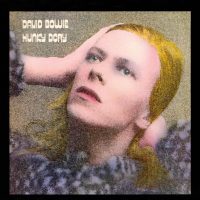 Recorded: 1971
Recorded: 1971
Producers: David Bowie, Ken Scott
Released: 17 December 1971 (UK), 4 December 1971 (USA)
Personnel
David Bowie: vocals, guitar, alto saxophone, tenor saxophone, piano
Mick Ronson: guitar, Mellotron, vocals
Rick Wakeman: piano
Trevor Bolder: bass guitar, trumpet
Mick ‘Woody’ Woodmansey: drums
Ken Scott: ARP synthesizer
Tracklisting
- ‘Changes’
- ‘Oh! You Pretty Things’
- ‘Eight Line Poem’
- ‘Life On Mars?’
- ‘Kooks’
- ‘Quicksand’
- ‘Fill Your Heart’
- ‘Andy Warhol’
- ‘Song For Bob Dylan’
- ‘Queen Bitch’
- ‘The Bewlay Brothers’
Hunky Dory was David Bowie’s first major creative breakthrough, and saw the coming together of his band the Spiders From Mars. With songs including ‘Life On Mars?’ and ‘Changes’, the album remains one of his best-loved works.
Hunky Dory gave me a fabulous groundswell. I guess it provided me, for the first time in my life, with an actual audience – I mean, people actually coming up to me and saying, ‘Good album, good songs.’ That hadn’t happened to me before. It was like, ‘Ah, I’m getting it, I’m finding my feet. I’m starting to communicate what I want to do. Now: what is it I want to do?’ There was always a double whammy there…
Uncut, October 1999
The background
In late 1970 Bowie signed a publishing contract with Chrysalis, and embarked on a songwriting spree. He recorded demos of his new compositions – mostly written, unlike his earlier works, on piano. One of these demos, of the song ‘Oh! You Pretty Things’, caught the attention of Peter Noone, formerly of Herman’s Hermits, who released it as a single in 1971 with Bowie on piano.
Various other collaborations occurred during this time, none of which saw Bowie take a leading role. He wrote a number songs for his friend Dana Gillespie, who wished to embark on a solo singing career following early excursions into acting, folk and teen pop.
Bowie recorded other demos with a trio named Rungk. Under the name Arnold Corns they recorded a single containing early versions of ‘Moonage Daydream’ and ‘Hang On To Yourself’. He also worked on several recordings with male sex worker Micky King, one of which, ‘Rupert The Riley’, was written about Bowie’s car, a 1932 Riley Gamecock.
These were early attempts by Bowie to find success as a writer, and to release his compositions with others fronting them. For a time Bowie seemed content to play a svengali role, with King and Freddie Burretti (also known as Rudi Valentino) acting as frontmen in his manufactured acts. These flirted with glam fashions and drew upon London’s underground gay culture, and pointed the way towards Ziggy Stardust‘s more developed synthetic stardom.
Bowie also resumed contact with Mick Ronson, who had worked magic on The Man Who Sold The World, and persuaded the talented guitarist and arranger to relocate to London from Hull. Ronson brought with him Mick ‘Woody’ Woodmansey from the previous album, and a new bass guitarist, Trevor Bolder.
All three, who had played together in the short-lived band Ronno, moved in to Bowie’s Beckenham home, Haddon Hall, to work on the new songs. Although they weren’t credited as such, Hunky Dory was the first album to feature the Spiders From Mars.
The band made their public debut on 3 June, recording a session for John Peel’s radio show In Concert. Among the songs performed were ‘Queen Bitch’, ‘Bombers’, ‘The Supermen’, ‘Moonage Daydream’ and ‘Looking For A Friend’. Bowie’s friend George Underwood sang on ‘Song For Bob Dylan’, and Dana Gillespie took the lead on ‘Andy Warhol’. These were followed by ‘Kooks’, ‘Oh! You Pretty Things’, and the closing song ‘It Ain’t Easy’.
Bowie’s professional life was changing, as were his personal circumstances. He had married Angela Barnett on 20 March 1970, and on 30 May 1971 their son Duncan Zowie Haywood Jones was born in Bromley Hospital. David was at home listening to Neil Young when the call arrived; he wrote the Hunky Dory song ‘Kooks’ shortly afterwards.


